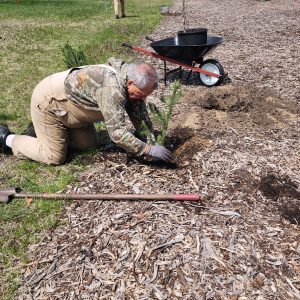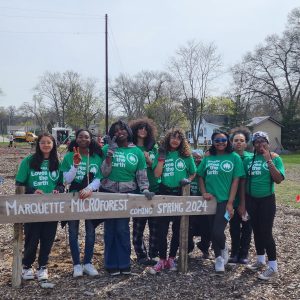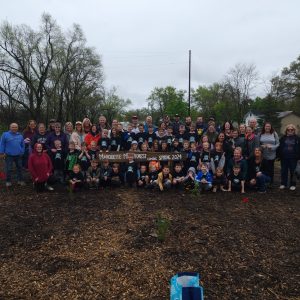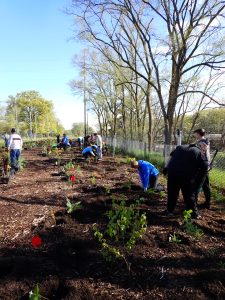Developed in partnership with the City of Muskegon, Muskegon Rotary Club, United Way of the Lakeshore, and WMSRDC, Muskegon has its first micro forest! Located in the Marquette neighborhood west of US-31, this multi-species forest is designed and planted to grow quickly and provide environmental benefits to the neighborhood such as reduction of noise pollution, storm water runoff, and access to public greenspace.
High performance micro forests are shown to grow faster than other forms of re-wilding or urban forestry due to its use of the Miyawaki method. The Miyawaki method focuses on the importance of native forests, and the function of diverse yet complementary species. Factoring in the warmer climate conditions and the need to protect against invasive species, a large variety of seedlings native to mid and southern Michigan are planted densely and randomly. Research shows that 3 years post-planting, natural selection among seedlings allow the thriving ones to develop quickly, producing a dense mature forest in 15-20 years. The dense placement and special soil preparations give to possibility to adapt a very small area of available land towards the broader purpose of preventing floods, cooling against Urban heat, and providing resiliency against high wind and other natural disaster impacts. Because of the rapid growth rate, high-performance micro forests intercept, filter, and transpire an enormous quantity of storm water that would otherwise transport pollutants and excess nutrients to larger bodies.
Four events were held to implement the micro forest:
- September 8, 2023: the Marquette Micro Forest location was a volunteer site for the United Way of the Lakeshore’s annual Day of Caring. Lead by City of Muskegon staff, 60 community members spread a layer of composted leaves, topped the compost layer with cardboard, and covered the cardboard with mulch.
- April 22, Earth Day 2024: 50 volunteers planted 150 bareroot white pines and other trees, as well as prepared the site for major implementation work.
- May 3, 2024: Students from the Pennsylvania Elementary School, a certified Michigan Green School located within the Reeths-Puffer school district, planted pines with the assistance of parents and volunteers from the City of Muskegon, United Way of the Lakeshore, and WMSRDC.
- May 10, 2024: Major implementation was completed with planting of over 2,000 plants ranging from high canopy trees to ground cover. Volunteers from Rotary Interact Clubs (Muskegon Public High School, Orchard View High School, and Oakridge High School), DTE Energy, WMSRDC, Muskegon Rotary, City of Muskegon, and United Way of the Lakeshore made implementation possible.
Over the events listed above, an estimated 197 volunteers volunteered 400.5 hours of their time to the micro forest!
Currently, the micro forest is gated, fenced in, and irrigated to allow the plants to establish. The micro forest will be open in the fall of 2024 for the public to enjoy. Stay tuned to WMSRDC and United Way of the Lakeshore’s social media pages for information on additional upcoming volunteer opportunities.
The Marquette MicroForest was generously funded through the Community Foundation for Muskegon County, Muskegon Rotary Club, and the Marquette Neighborhood Association.
Marquette Micro Forest Fact Sheet
Native and Invasive Species Fact Sheet




